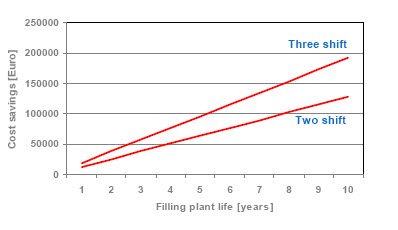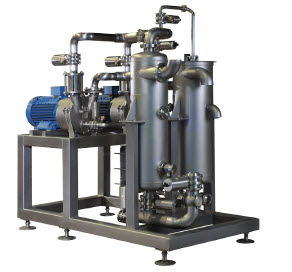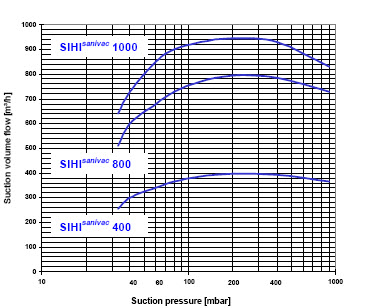Beverage Filling Lines Reduce Water Consumption On Vacuum Pumps
Major cost savings are guaranteed by using an environmentally-friendly hygienic vacuum system in all beverage filling processes

Potential savings through the reduction of water consumption are of critical importance to the beverage industry in today’s market.
Example: Vacuum pumps with a once-through service liquid system, will consume 2 m cubed of water per hour. The average cost for water (supply and waste) can be calculated at 2 Euro per m cubed. Due to the total water usage of the vacuum pump, the following savings can be achieved, by using a closed loop system: an estimated 99% reduction in water consumption.
 Description of Operation:
Description of Operation:
- The heart of the hygienic vacuum system uses the established and respected compact SIHI liquid ring vacuum pump. Depending on the required suction volume capacity can, if required, be met using two vacuum pumps.
- To separate liquids and foam from the drawn gas on the suction side we have installed a level indicated separator.
- The compression heat of the vacuum pump is removed by a heat exchanger, which can be “cleaned in place” and operates with the product, cooling water, brine or other associated liquids.
- The service liquid is separated and derived from the pumped gas by the service liquid separator.
- Separators, pipes, fittings and pumps are manufactured from stainless steel (1.4404, 1.4408).
- Unlike conventional vacuum systems, this system ensures all pipes, separators and fittings of the hygienic vacuum system can be “cleaned in place” and provides maximum safety levels against microbiological contamination.
- The “clean in place” function of the hygienic vacuum system can easily be integrated into existing CIP systems.
- All components are mounted on a stainless steel baseplate.
CIP capability
Flowserve SIHI hygienic vacuum systems are designed to ensure a biologically safe system through the use of a hygienic design.
All components are manufactured in stainless steel and the welded joints are passivated.
The heat exchanger is also designed to meet the hygienic design standards and all EMSR components and valves can be “cleaned in place”.
It is possible to drain the complete system and integrate it into an existing CIP system and into the process control systems of the filling plant.
 Biologically safe
Biologically safe
Conventional vacuum systems with close service liquid circles are not biologically safe and they are therefore a risk to the process. After some operating hours the drawn liquid, for example, beer, is concentrated in the service fluid and this becomes an optimal culture medium for bacteria if the temperature is in the range of 18 to 28°C. Infection of the process happens after a short operating time due to the existing microbes and the contamination of the service fluid. Conventional vacuum systems cannot be cleaned reliably if they are only flushed with a CIP fluid and therefore they do not fulfil the requirements of the food and beverage industry. Only hygienic vacuum systems will guarantee the highest level of a biologically safe filling process.
Robust vacuum generation
For over 80 years Flowserve SIHI has maintained its position as a leading supplier of liquid ring vacuum pumps, liquid ring compressors and dry running vacuum pumps to a wide range of process and related markets. Close contact is maintained with customers to ensure that product development is geared to marketplace needs. This is supported by investment in “state of the art” manufacturing to promote consistent quality.
Short return-on-investment time
By using our hygienic vacuum systems in the areas of filling plants, it is possible to save more than 99% of water consumption. The return-on-investment period for these hygienic systems is considerably shortened. If you’re considering investing in an economic filling system please keep in mind the cost savings of our hygienic vacuum system solutions.
In summary the Benefits:
-
- No water consumption during the filling process due to hygienic and clean-in-place design.
- Environmentally friendly as well as offering cost savings.
- Reliable vacuum generation.
- Highest level of biological safety.
- Using existing CIP systems.
- Short return on investment period.
To discuss reducing water usage on your beverage filling line vacuum pumps please contact John Scott at ESI in the UK at +44 1633 877505 or Ireland at +353 21 4510900 or please send us an enquiry via the form.
